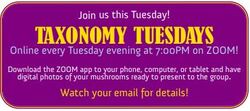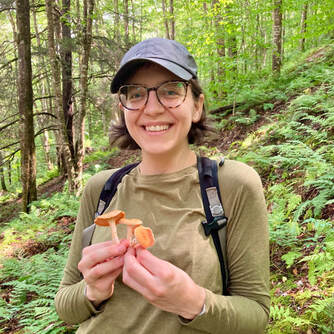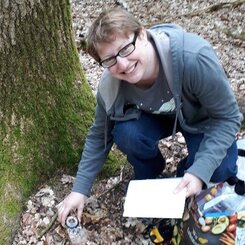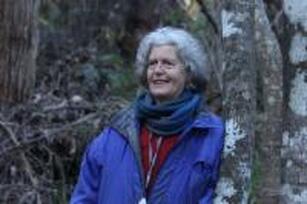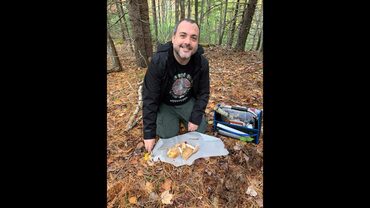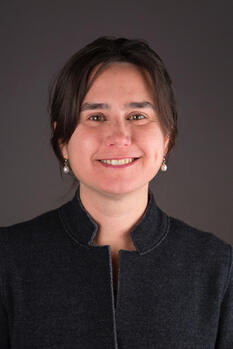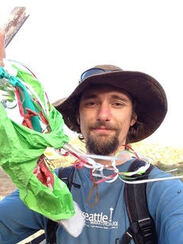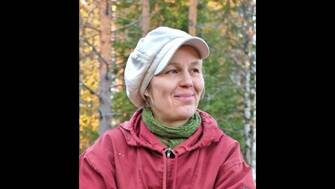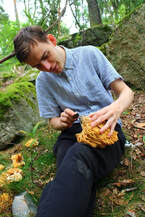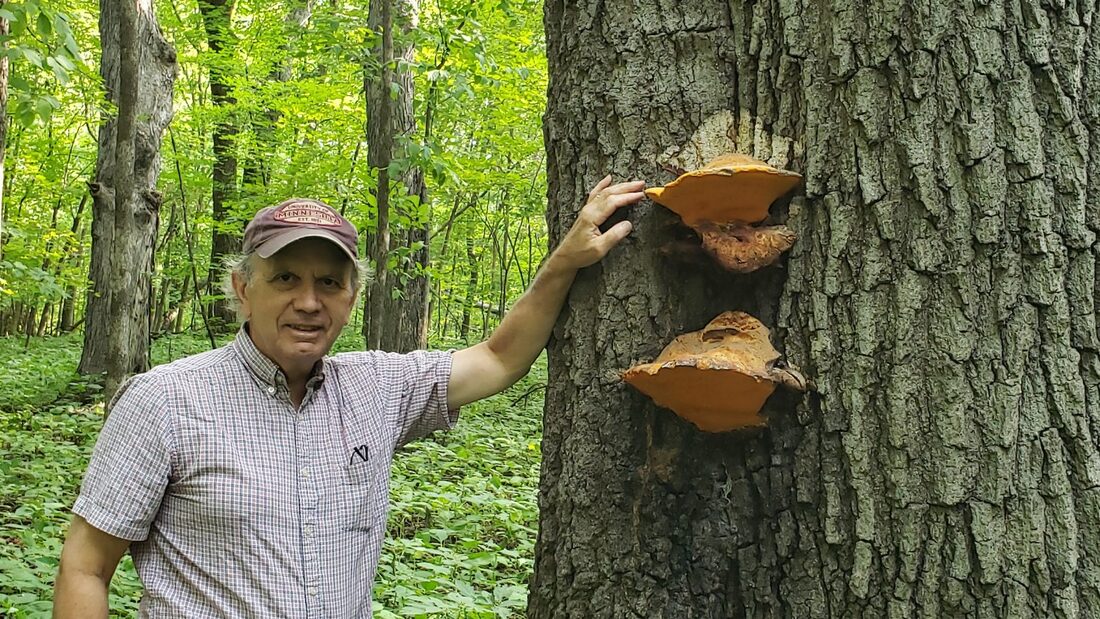VIRTUAL EVENTS
Online LECTURE SERIES for 2024
The 2024 Online Live Lectures have ended.
However most have recordings available to NJMA Members.
However most have recordings available to NJMA Members.
Only NJMA Members will be sent a link to attend online lectures. So be sure to renew your annual NJMA membership in January and not June. New lectures will be listed when their arrangements have been confirmed.
|
Thursday January 25, 2024 7:30pm
Diversity and Evolution of Chanterelles and Allies This talk will discuss the common edible chanterelle mushrooms and their relatives. Despite their appearance, chanterelles are close relatives of a wide assortment of fungi with diverse forms that play many different roles in our ecosystems. How is it that such an oddball assortment of fungi are all closely related? How many species of chanterelles grow in North America? How can you tell species apart from each other, and from lookalikes? We will cover these topics and more! |
Speaker: Rachel Swenie is a mycologist with expertise in the macrofungi of eastern North America. She earned her PhD in Ecology and Evolutionary Biology from the University of Tennessee and is currently a Farlow Fellow at Harvard University.
|
|
Thursday February 8, 2024 7:30pm
Yeasts: The Enormous Diversity of Single-Celled Fungi Most fungi are completely invisible to humans. While we love to admire beautiful mushrooms and other large fruiting bodies in the forest, entire communities of cryptic and microscopic fungi are living and growing under our feet. Single-celled fungi, also known as yeasts, are among these cryptic fungi. Because they are single-celled, we can't see them with our own eyes, and yet they exist in almost all environments on Earth. The single-celled growth form evolved several times from hyphal ancestors and is common worldwide, but yeasts' roles in ecosystems are often mysterious. In this talk, I will introduce you to the wonderful world of naturally-occurring yeasts; giving some historic context on how humans have been interacting with yeasts for thousands of years, before discussing what we do and don't know about yeast ecology in nature. Then I'll discuss my own work with yeasts: I work with yeasts in several natural New England habitats, including temperate forests and carnivorous plants. I am working to expand our knowledge of yeast ecology and evolution by focusing on how yeasts interact with other living things in nature. With this talk, I hope to give audience members a new appreciation for the mysterious and intriguing invisible fungal diversity they encounter every day. |
Speaker: Primrose Boynton is an assistant professor in Biology at Wheaton College in Massachusetts, USA. She received her PhD in Organismic and Evolutionary Biology from Harvard University in 2012, where she studied the diversity and ecology of yeasts in carnivorous pitcher plants. She went on to work at the Max-Planck Institute for Evolutionary Biology in Plön, Germany, on the ecology and evolution of Saccharomyces species in their natural environments. She is broadly interested in what determines microbial fitness in natural environments, and uses the diversity of yeasts, with a focus on model organisms in nature, to understand yeast and microbial ecology and evolution.
|
|
Sunday February 18, 2024 5pm
Myxomycetes at Black Sugarloaf, Northern Tasmania - A Slime Mo(u)ld Hotspot The taxonomic position of slime moulds has baffled naturalists and scientists for centuries. When “the father of taxonomy”, Swedish botanist Carl Linnaeus, devised his system of classification, he included slime moulds (and fungi) in the plant kingdom. Slime moulds were subsequently placed in various kingdoms but are now regarded as amoebozoans. Sarah Lloyd has observed slime moulds in a eucalypt forest at Birralee Tasmania for 13 years. It is now considered a hotspot for myxomycetes, with over 120 species documented from the site including 4 hitherto undescribed species, one new genus and more new species awaiting further study. In this webinar Sarah will discuss these and also describe the important ecological roles of slime moulds. |
Speaker: Sarah Lloyd has had a lifelong love of birds and, since 1988 when she moved to live in a forest at Black Sugarloaf, Birralee in central north Tasmania, an interest in plants, bryophytes, fungi and slime moulds. She has contributed to several citizen science projects including the Australian Bird Count, and Fungimap, a project to record Australia’s undocumented fungal species. It was through Fungimap that Sarah was introduced to slime moulds. In 2019 she was awarded an OAM (Order of Australia medal) for “services to conservation – and slime moulds”. She is the author of numerous books, including Where the Slime Moulds Creep (4th Edition, 2022).
|
|
Thursday February 29th 2024 7:30pm
Diversity of Pluteus in North America We will present an overview of the taxonomy and distribution of the species of Pluteus in North America based on morphological studies and molecular phylogenies. A total of 120 taxa (species and varieties) of Pluteus have been described from or reported in North America, but currently only c. 40 of these species have been confirmed to occur here, based on molecular data generated from North American voucher collections. We will discuss the ongoing, collaborative projects to clarify the status of old names in the genus, and to describe a good number on new species, through a combination of morphological and molecular approaches and collaboration with citizen-scientists. |
Speaker: Alfredo Justo is Curator of Botany & Mycology at the New Brunswick Museum. Dr. Justo joined the Natural History Department of the New Brunswick Museum in June 2019. He oversees the curation and growth of the NBM Herbarium, which comprises over 100,000 specimens of plants, fungi, lichens, bryophytes and algae from New Brunswick and neighboring regions. His research focuses on the fungal diversity of New Brunswick & Atlantic Canada, while maintaining ongoing global taxonomic research on selected genera of mushrooms.
Dr. Justo completed his PhD in systematic mycology at the University of Vigo, Spain, in 2006. Following several years of projects in Spain related to mycological conservation and diversity, he spent six years (2009-2014) in a postdoctoral research position with Dr. David Hibbett at Clark University (Massachusetts, USA), focusing on molecular systematics of mushroom-forming fungi. Research and teaching positions followed, in Mexico, Spain, and eventually back to the USA where Dr. Justo was a Visiting Assistant Professor in the Biology Department at Worcester State University and a Visiting Scholar at Clark University. More on Dr. Justo’s research interests & publications at https://alfredojusto.weebly.com/ |
|
Thursday March 14th 2024 7:30pm
Last Chance to Know? The Changing Biogeography of Mushrooms and The Death Cap in California As humans reshape Earth’s biodiversity, conservationists and the public worry about what will happen to animals and plants. But what about fungi? Mushrooms are also on the move, and movements are often mediated by commerce and trade. Humans brought the fungus Amanita phalloides to California, and it is now invasive. How did that happen and why is it spreading? |
Speaker: Anne Pringle was born in Kuala Lumpur, Malaysia, and spent her childhood traveling through Southeast Asia and West Africa. After being dragged along on one-too-many birding expeditions, she abandoned the birds for fungi. She got her Ph.D. in Botany and Genetics at Duke University. After completing a Miller Institute for Basic Research in Science Fellowship at the University of California, Berkeley, she joined the faculty at Harvard University. She next moved to the University of Wisconsin, Madison, where she is now a Vilas Distinguished Achievement and the Mary Herman Rubinstein Professor in the Departments of Botany and Bacteriology. Pringle has given over 180 talks to academic and popular audiences in countries including China, Colombia, France, Singapore, Sweden, Thailand, and the United States. She has been awarded the Alexopoulos Prize for a Distinguished Early Career Mycologist (2010), the Mendelsohn Excellence in Mentoring Award from the Harvard University Graduate Student Council (2011), the Fannie Cox Prize for Excellence in Science Teaching from Harvard University (2013), a Radcliffe Institute for Advanced Study Fellowship (2011-2012), the Mid-Career Mycorrhiza Research Excellence Award from the International Mycorrhiza Society (2019), and a Fulbright U.S. Scholarship (2022-2023, taken to South Africa). She is a National Geographic Explorer. In 2019, Pringle was elected President of the Mycological Society of America. To see Pringle talk about fungi, invasion by death caps, and the microbiomes of pitcher plants, please visit ibiology. To read her publications and see her lab’s video about working with fungi please visit her laboratory
|
|
Thursday April 4th 2024 7:30pm
iNaturalist: Observing Mushrooms, Making Data, Motivating Mycologists Through Project Stewardship iNaturalist is a powerful community science tool that allows users to easily contribute observations of mushrooms and other organisms to the world's largest public database of species biogeography. In the process of contributing data, users are able to increase their knowledge of species by suggestions from a well trained artificial intelligence and by a number of active mycologist that curate the data that enters the platform. The ability to collect metadata from microscopy to DNA sequences to chemical reactions and the capacity to point to other observations of host plants etc makes for extremely rich observations. Observations can be collected into projects that can be sliced based upon geography, time, species of interest, etc and allows for real-time monitoring. This presentation will dig into the basics of how to use iNaturalist; making observations, mining data, and using projects. I will highlight the Fungal Diversity Survey's CA FUNDIS Year 1 project where over 5,000 vouchered collections were made and many of them received DNA sequencing as a model for project stewardship. |
Speaker: Damon Tighe is an amateur mycologist from Oakland California who is a big user of the iNaturalist platform. He is a collector for the California Fungal Diversity Survey (FUNDIS) and has done fungal surveys in Ecuador, Arizona, among other locales using iNaturalist as the primary tool to collect and share data with stakeholders. In his professional life he was a former researcher on the Human Genome Project and now helps translate biotechnology techniques into classroom activities for educational institutions across the country.
|
|
Sunday April 14th 2024 - 10:00am (Morning)
Polypore succession 33 years after prescribed fire – a case study from Finland In 1989, a standing forest in Finland was burnt for restoration purposes. It was a first in Finland – and perhaps in the whole of Europe. Collections of wood-decaying polypore fungi were studied on the burn site, beginning a year before the fire and continuing for 33 years after. It is likely that the number of species observed during the study period was a record for any one-hectare forest area in Finland. Several red-listed species were found and in general, the effects of burning appeared to have a positive effect on polypore diversity. [This lecture will not be recorded] |
Speaker: Kaisa Junninen works as a senior specialist on species conservation at Metsähallitus Parks & Wildlife Finland. She is a forest ecologist who has specialized in polypore fungi, deadwood ecology and natural forests, and has been in charge of red-listing polypore fungi in Finland. She is featured in Considering Fungi, Episode 1: Facilitating Habitat Formation in Boreal Forests
|
|
Sunday April 14th 2024 2pm (Afternoon)
Fungi of Mediterranean Portugal |
Speaker: Maricel Patino - NJMA member and Facebook contributor.
|
|
Sunday April 28th 2024 11am
Not All Coral Fungi are Ramaria Field Characters and Taxonomy of Ramarioid Fungi within the Order Gomphaceae. |
Speaker: Martin Axegård fell down the Ramaria rabbit hole 3 years ago. Ramaria are some of the most conspicuous members of basidiomycota – colorful, prolific, and frequently growing to an impressive size. They have a reputation of being hard to identify. Martin took this “bad rep” as a provocation and leapt into all the literature on the subject, picking up basic mycological Italian along the way. He is now one of the top Ramaria experts in the EU, particularly in the Nordic countries, with a proficiency for identifying them by macroscopic characters. Over the past 2 years, he has sequenced over 500 collections of Ramaria, providing a more complete picture of species occurring in Sweden. This work has demonstrated that many species have a strictly boreal distribution and are undescribed. He is a board member of Stockholms svampvänner (‘Stockholm’s Mushroom Friends’).
|
|
Thursday May 9th 2024 7:30pm
Fungal World Wonders: A Discussion of Some of the Most Amazing Fungi I Have Encountered Since the MycoConsortium of the Northeast is filled with people that have great interest in fungi, this presentation will focus on some of the wonders of the fungal world that Bob has encountered over the past decades. These examples are in his top list of fungi that represent the extraordinary nature of the fungal kingdom – they are fungi with a WOW factor. |
Speaker: Bob Blanchette is a professor in the Department of Plant Pathology at the University of Minnesota where he teaches classes and carries out research on the biology and ecology of fungi that grow on and attack trees and wood. He has studied fungi from Minnesota’s old growth temperate forests to the rainforests of the Amazon and tropical forests of Asia as well as many investigations on fungi in the Arctic and Antarctic. His studies on wood decay processes have led to many collaborative projects around the world to help conserve ancient and historic woods including sunken ships, Old Kingdom Egyptian wooden statues, King Midas’ Tomb, expedition huts in Antarctica built by Scott and Shackleton and many others. He also has been involved with many ethnomycological investigations to understand better how Indigenous People from different parts of the world used forest fungi. A few of his current studies include investigating gigantic bioluminescent fungal networks in the Ecuadorean Amazon, using fungi to control invasive exotic species such as the emerald ash borer and buckthorn and the taxonomy of Ganoderma and other polypores.
|
|
Sunday May 19th 2024 11am
[This will be the last NE Consortium Lecture in 2024] Orbiliomycetes, a diverse, species-rich group of inoperculate discomycetes with fascinating morphology and peculiar ecology The Orbiliomycetes are a class of ascomycetes which belongs to the first which produced ascomata. It only includes one family, Orbiliaceae, with 10 genera and around 500 described species. Among them, the genus Orbilia is presently the most species-rich with around 415 species. Morphologically, the class is characterized by very small disc- or bowl-shaped fruiting bodies, usually 0.2–2 mm in diameter, with a whitish or reddish to yellowish or rarely brown to black color, and by ascospores containing a spore body, a refractive vacuolar organelle that only occurs in this class, and by a holoblastic hyphomycetous anamorph. Ascospores, spore bodies and the conidia of the anamorph develop highly diverse shapes. Spore bodies are not persistent in herbarium material and require study when still alive. The asci are always inamyloid and capable of active spore discharge, and vary between 8- and 128-spored. The species occur worldwide on dead wood and bark but also on herbaceous and fungal substrates. Many species are drought-tolerant, therefore, the highest species numbers have been recorded in arid areas. The neglect of this ecological niche is the main reason for the high number of newly described taxa in our monograph. In addition to the saprotrophic lifestyle, catching nematodes, rotifers, amoebas and even small insects is known in some species. |
Speaker: Hans-Otto Baral got interested in fungi through the ‘Pilzverein Stuttgart’, a mycological association in which also his father was a member. At the University of Tübingen under Franz Oberwinkler he made his diploma on the Sarcoscypha species complex. Later he concentrated on inoperculate discomycetes and, after presenting together with German Krieglsteiner a survey of the species known in Germany, published on various genera, including a taxonomic clarification around Hymenoscyphus fraxineus, the cause of the ash dieback disease. In 2016 he covered the non-lichenized discomycetes in a survey (‘syllabus’) of the families of ascomycetes. Various projects were done in collaboration with institutional and amateur colleagues world-wide. In 1992 he published a methodological paper about his so-called “vital taxonomy”, which led to the monographic study of Orbiliomycetes as an exemplification of the taxonomic importance to study fungal cells in the living state.
|
Last Updated: 2024-05-13

